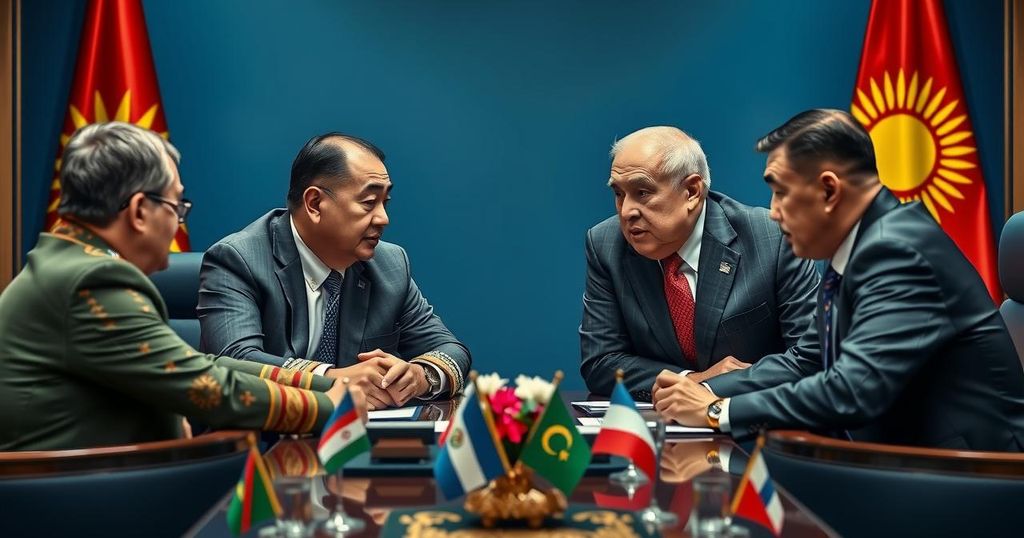Kassym-Jomart Tokayev’s state visit to Mongolia marks a significant revival of bilateral ties, the first in 16 years, overcoming past diplomatic stagnation. This visit aims to enhance economic cooperation, with trade increasing dramatically from $29 million during the pandemic to $150 million in 2023, alongside ambitious future goals of $500 million. Key agreements include collaboration in satellite technologies and nuclear energy, indicating a strategic partnership focused on mutual growth and strengthening relations in Central Asia.
The recent state visit by Kassym-Jomart Tokayev to Mongolia marks a significant step toward reviving and strengthening the strategic ties between Kazakhstan and Mongolia, a development that had been dormant for over 16 years. Despite the long-standing diplomatic relations established three decades ago, previous Kazakh President Nursultan Nazarbayev’s administration had put connections with Ulaanbaatar on hold, largely due to concerns surrounding Mongolia’s political instability and reputation in the region. Mongolia has faced a history of political upheaval, highlighted by violent protests, such as those in 2008 following contentious parliamentary elections, which underscored the potential volatility of its internal politics. Furthermore, regional dynamics exacerbated concerns, given past revolutions in neighboring countries between 2003 and 2005, leading to perceptions of an ‘export of revolutions’ driven, in part, by foreign interests. Tokayev’s landmark visit not only emphasizes Kazakhstan’s renewed focus on Central Asian relations, but also acknowledges Mongolia’s integral role in the region. The Kazakh diaspora, constituting over 117,000 individuals in Mongolia, further provides a robust foundation for collaboration between the two nations. The high-level discussions between President Tokayev and his Mongolian counterpart, Ukhnaagiin Khurelsukh, aimed to elevate their ties to a strategic partnership, thus bringing tangible outcomes to this long-neglected relationship. Evidence of the revitalized diplomatic efforts is reflected in trade statistics, which indicate a troubling decline in trade between the nations from 2017, hitting a low of $29.3 million in 2020 due to the COVID-19 pandemic. However, by 2023, trade surged to $150 million, illustrating the potential for future economic collaboration. During a joint briefing, Tokayev articulated an ambitious goal of increasing trade to over $500 million in the near future, a target that appears feasible given the recent upward trend. The Kazakh delegation was proactive during the visit, signing an investment agreement for satellite mapping services, to be generated through Kazakhstan’s inaugural space program. Both countries also concluded a memorandum on nuclear energy cooperation, hinting at Mongolia’s interest in adopting Kazakhstan’s recent advancements in this sector. Furthermore, deputy director of the Center for Political Studies at Kazakhstan’s Institute for Philosophy, Political Science and Religious Studies, Rustem Mustafin, outlined key outcomes of Tokayev’s visit, emphasizing a cooperative effort in the exploration and development of critical mineral resources. Mustafin noted the burgeoning global demand for these materials, critical for high-tech manufacturing, and underscored the potential benefits of collaboration to create favorable conditions for foreign investment across various sectors, including mining and technological advancement. Overall, Tokayev’s visit represents a significant diplomatic renaissance for Kazakhstan, signaling a renewed commitment to foster and enhance bilateral relations with Mongolia, an endeavor likely to yield substantial benefits for both nations in diverse areas of cooperation.
This article examines the implications of Kassym-Jomart Tokayev’s recent state visit to Mongolia, the first by a Kazakh president in 16 years. It highlights the historical context of diplomatic relations between Kazakhstan and Mongolia, emphasizing the stagnation under former President Nursultan Nazarbayev due to Mongolia’s political instability. The article also covers the socio-political dynamics influencing this relationship, addressing trade statistics, Kazakh diaspora, and agreements made during the visit that aim to strengthen ties in various sectors including space and nuclear energy. Overall, it illustrates the renewed efforts of Kazakhstan to deepen its ties in Central Asia.
Tokayev’s visit to Mongolia marks a pivotal moment in reviving bilateral relations after a substantial hiatus. This diplomatic engagement indicates Kazakhstan’s strategic intent to foster closer partnerships within the region, leveraging shared history, economic potential, and a strong Kazakh diaspora. The confirmed agreements during the visit point towards a promising path for future collaboration across multiple sectors, reinforcing the notion that Kazakhstan seeks to bolster its influence and connectivity within Central Asia.
Original Source: timesca.com






